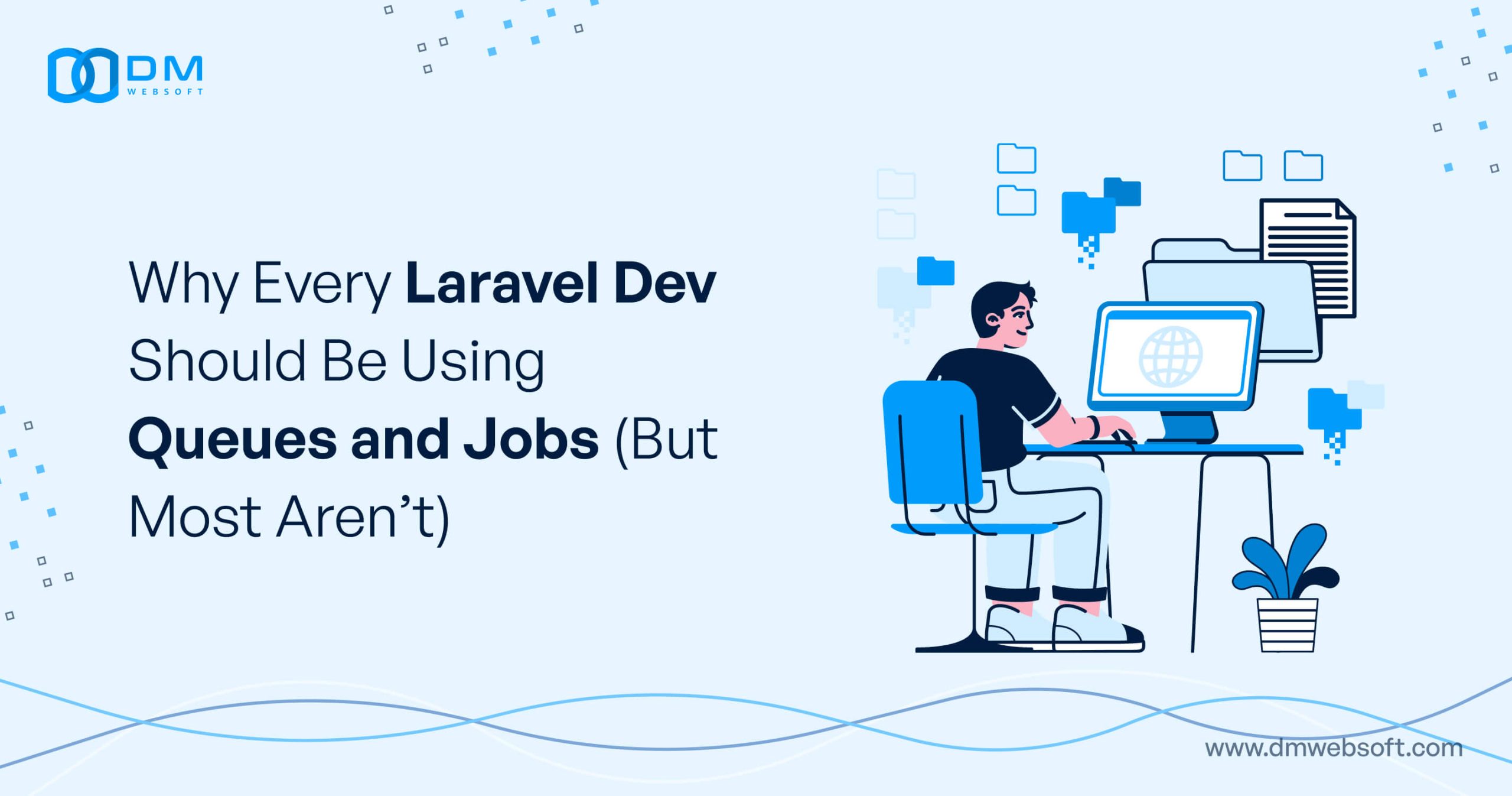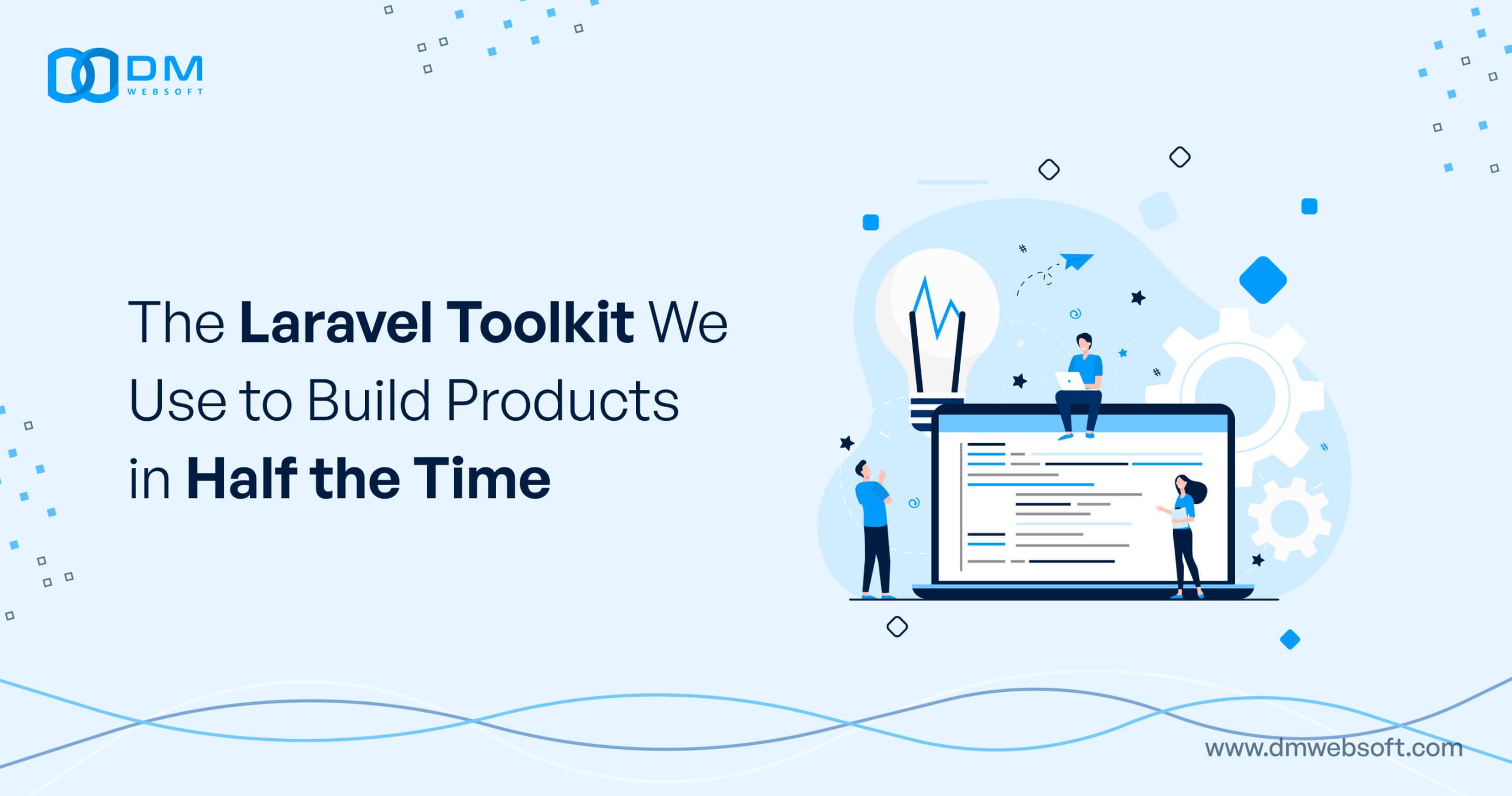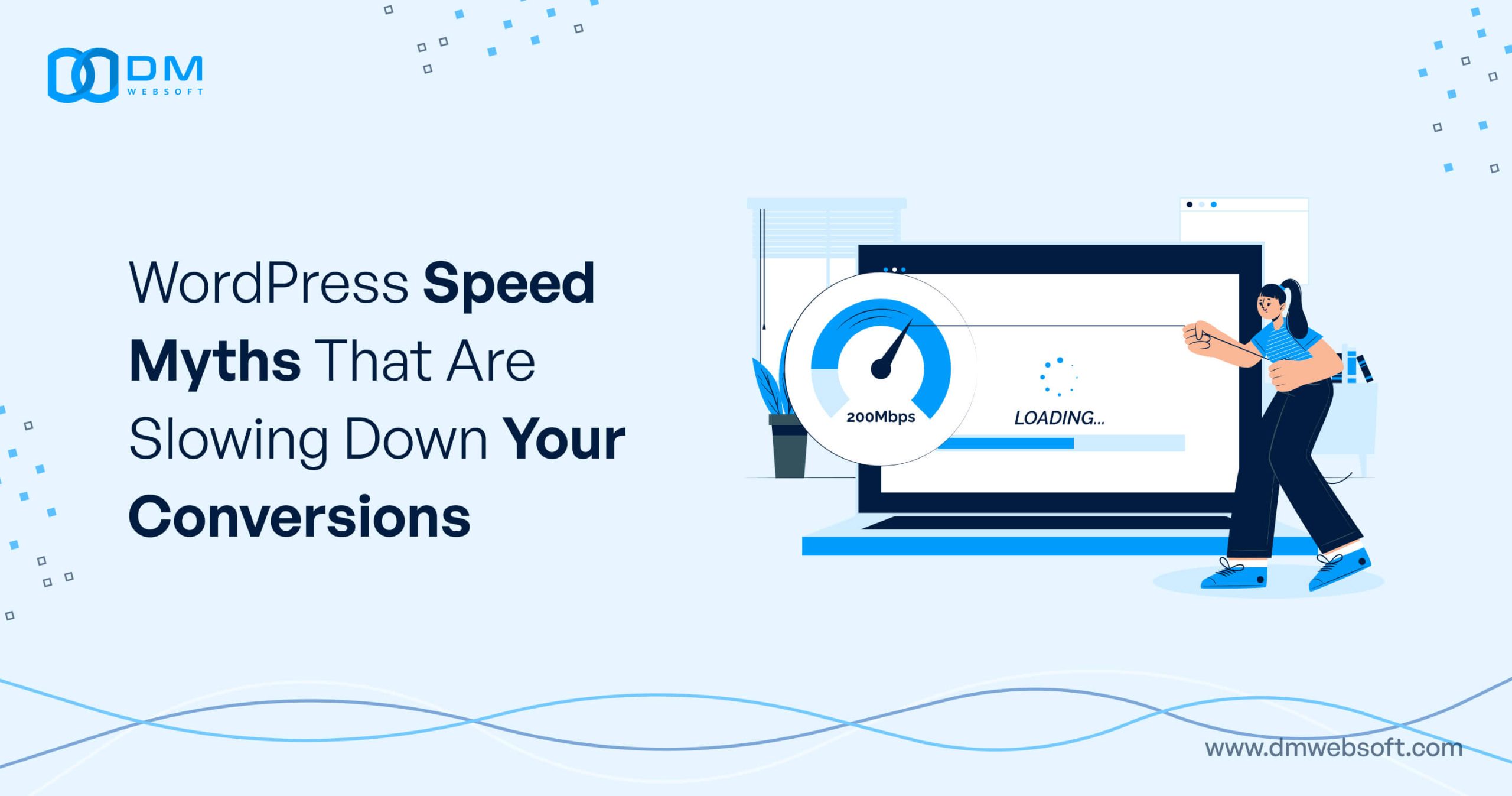DM WebSoft LLP exceeded our expectations! Their seasoned team of experts delivered a website that perfectly captures our brand essence. Their 15+ years of experience truly shine through in their exceptional web development skills.
Best Practices for Managing API Dependencies in Large Projects
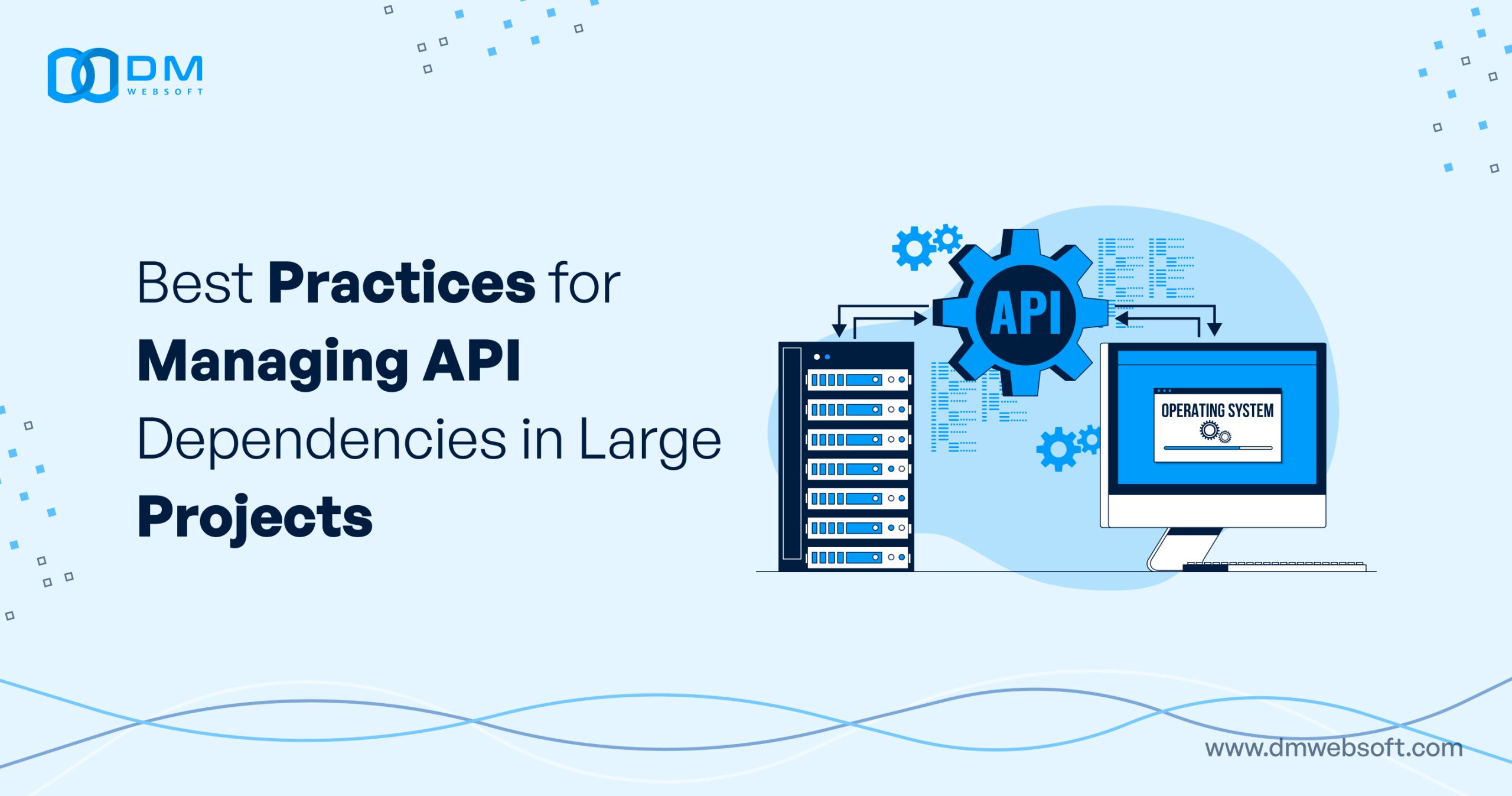
TABLE OF CONTENT
Get in Touch
Introduction
Effective API dependency management has become more than imperative for large projects in this fast-evolving software development world. Application Programming Interfaces, APIs act as bridges, allowing interaction between different software systems. The increasing size and complexity of the projects increase the dependencies, and hence, its management becomes a complex but indispensable task. In the lack of management, version conflicts, security vulnerabilities, and performance bottlenecks hinder overall software functionality.
DM WebSoft LLP specializes in offering an API management solution that is designed according to the specific requirements of any large project. Our expertise guarantees that your API dependencies will be handled with the precision that only serious concern permits so your systems run smoothly and effectively. This blog shall take you through the best practices in managing dependencies on APIs in larger projects, discuss the usual challenges that one is likely to face, and share some real case studies that depict the effectiveness of these practices.
Understanding and managing API dependencies are essential for a couple of reasons: it helps maintain the integrity and functionality within the software. This will prevent conflicts and compatibility issues by components that have poor performance. Secondly, proper management in terms of API dependencies can do quite a bit to improve the performance and security of an application. This consists of maintaining an inventory of versions of APIs, having strong authentication and authorization methods, and updating and maintaining APIs regularly.
Thirdly, strategic management of API dependencies has the potential to bring resource utilization and cost savings. By using automated testing and monitoring tools, you can identify and resolve issues at an early stage, reducing downtime and maintenance costs. Secondly, with well-documented APIs and dependencies, new team members will find it easier to understand and work with the system for better productivity and collaboration.
DM WebSoft LLP grasps these complications and, hence, provides all-around services to help you tackle them. Our team of professionals offers documentation, version control, automated testing, and monitoring such that API dependencies can be managed effectively. Use our experience and advanced tools to reach the goals of your project while ensuring that performance and security are at the highest level. By the end of this blog, you will obtain detailed knowledge of best practices to manage API dependencies in large projects and how to implement them in your project.
Understanding API Dependencies
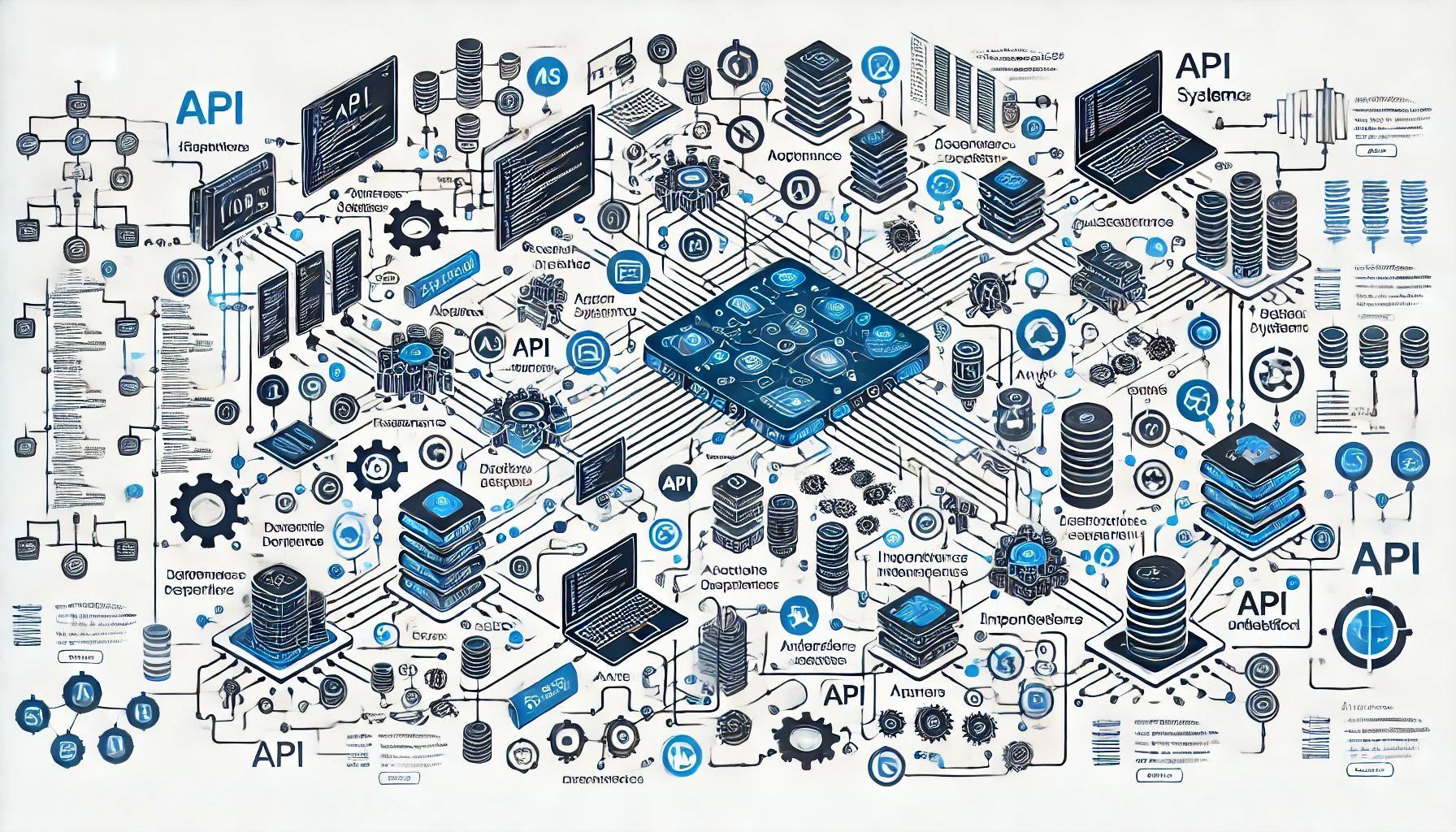
In the world of software development, an API dependency is an essential element that assures different software components can communicate and work together seamlessly. In other words, an API dependency refers to the reliance of one software component on an external API to perform its function. In big projects, these dependencies can become complex since different systems and services must talk to one another.
Consider an e-commerce platform that requires payment processing: it would depend on APIs from various payment gateways, banking institutions, and fraud detection services. Each of these APIs will represent a single dependency, and each of these dependencies should be managed well for the system to run smoothly. Issues such as version conflicts, security vulnerabilities, and performance bottlenecks become real problems if not properly managed.
Careful management of API dependencies is critical to considerable project integrity and functioning. Management ensures that all the components work together without conflict, handle updating with ease, and that issues are quickly detected and resolved. And here is where best practices come into play: they provide guideline frameworks and strategies for dealing with dependencies.
We at DM WebSoft LLP know how vital managing API dependencies can be for a large project. Our API management expertise allows businesses to navigate dependency complications without project bottlenecks. We enable our clients to steer clear of common pitfalls and reach their project goals by practicing best methods with the help of world-class tools.
API dependencies mean much more than that for systems. Doing this securely, effectively, and reliably must involve careful planning, documentation, and regular maintenance. For instance, one needs to be on top of which versions of an API the application uses and ensure that any updates are compatible with the system.
Beyond documentation and version control, these require robust testing and monitoring practices. Automated tests can catch problems at an early stage before going live. Observability tools assist you in the monitoring of API behavior and swiftly find a trail of low-performance or misconfigured parts.
DM WebSoft LLP helps its customers in many ways by which they can handle their API dependencies. Our team takes over your documentation, version control, testing, and monitoring to spend more time building the business and less on maintaining the system’s complexity. With such experience and know-how, you will see that your project is kept on course and proceeds smoothly.
When API dependencies are understood and managed correctly, they avert common issues that threaten the security, efficiency, and reliability of a project. This increases not only the overall performance of your application but also provides you with a delivery of experiences for your users. It can be straightforward and efficient to deal with dependencies in APIs, considering that proper strategies and tools are set in place. That way, you’ll succeed in your large projects.
Common Problems in API Dependency Management
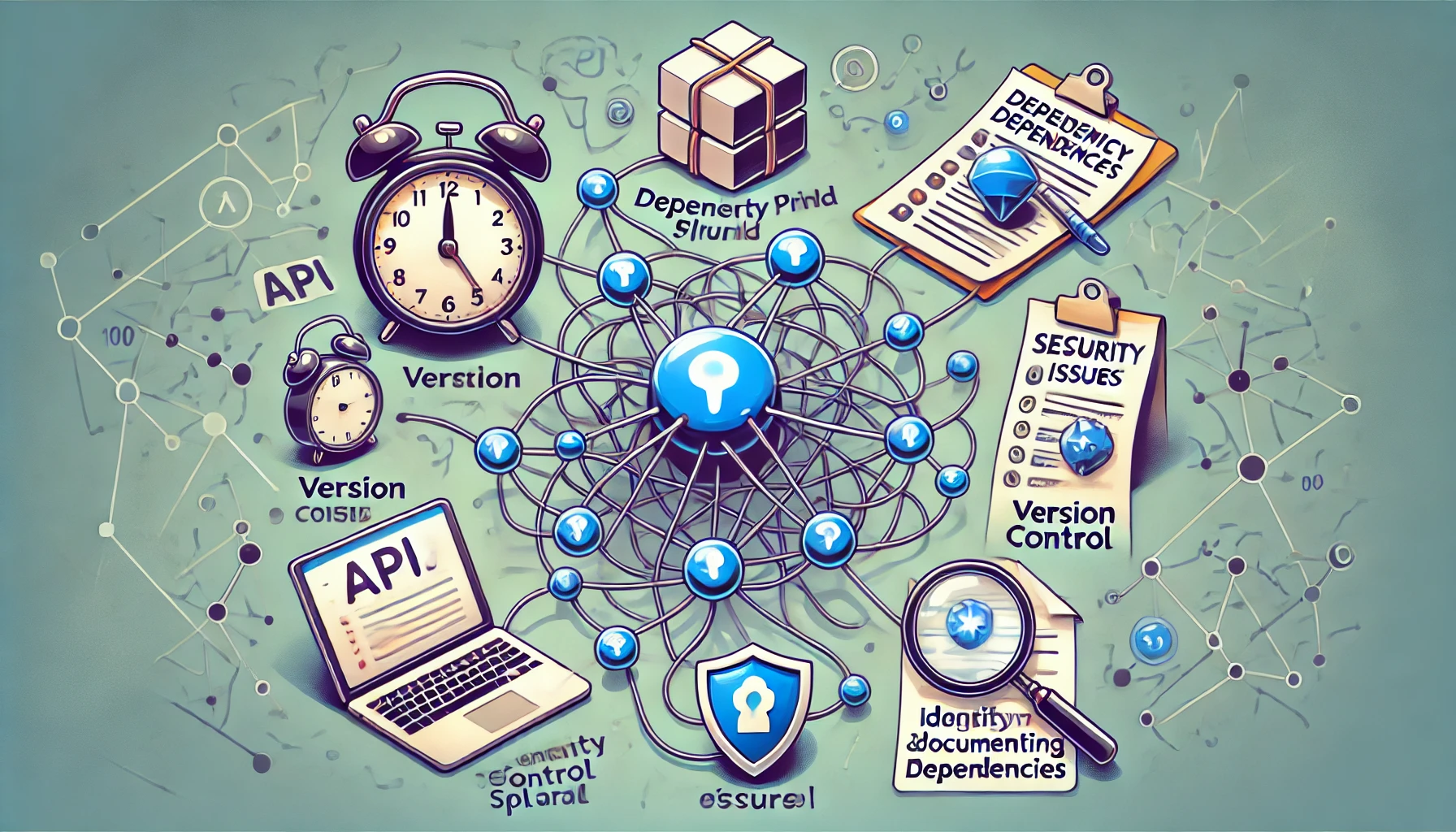
It’s like opening a can of worms when implementing API dependencies in big projects. The more significant the projects and the larger the number of APIs, so are the complexities in their management. Knowing the challenges is the first part of managing the dependencies between APIs effectively. Some common problems developers and project managers face are discussed below.
Detection and Documentation of Dependencies
One of the more significant challenges in managing API dependencies is detecting and documenting all the APIs on which the project depends. Larger projects depend on numerous internal and external APIs, and each API might have a different function altogether. Without a good understanding of such dependencies, it gets tough to manage upgrades, troubleshoot issues, and ensure compatibility. Documentation is critical but also very time-consuming to update.
Version Control and Compatibility
APIs are occasionally upgraded to include new features, bug fixes, or performance improvements, which could potentially lead to compatibility issues for an existing system. Juggling these different versions of an API and keeping your system afloat as they change in some drastic way is a severe challenge. This is where the need for mechanisms of semantic versioning can help, even if they require strict adhesion and regular surveillance.
Performance Bottlenecks
APIs sometimes act as bottlenecks when developers work with vast amounts of data and requests. This becomes an issue regarding latency with the APIs not being optimized or with network issues. Recognizing such bottlenecks and optimizing the performance of an API helps maintain the system’s overall efficiency.
Security and Compliance
Ensuring a secure API dependency is another major challenge. APIs usually expose some sensitive data, and for that reason, they become the target of cyber-attacks. Proper mechanisms of authentication and authorization should be put into place to bar unauthorized access. Also, handling APIs is further complicated by ensuring that they meet the standards expected in a given industry and align with the defined regulations, such as GDPR or HIPAA.
Dependency Sprawl
Dependency sprawl denotes the condition where the number of dependencies on an API increases with growing projects. That makes it challenging to manage and monitor all of those dependencies properly. Dependency sprawl increases your maintenance efforts and the risk of conflicts and failures.
Example
Consider a leading e-commerce platform that can integrate with multiple payment gateways, shipping providers, and marketing tools. Each of these is an integration where their API forms a dependency. Recently, when one of the payment gateways updated its API, it disrupted the payment processing system because the e-commerce platform was not prepared for the changes. This led to gigantic downtime and, consequently revenue leakage. As soon as they implemented proper documentation, versioning, and automated testing, such mishaps were overcome.
Well, DM WebSoft LLP understands all these bottlenecks and offers holistic solutions for you to manage all the API dependencies correctly. Our API management expertise also ensures that all dependencies are correctly documented, versioned, and monitored—preventing issues even before they come up. From the latest technology to the best of resources in the optimization of the performance of APIs, you can be sure of safety and security measures, enabling you to focus on your core business as we take care of the complexities.
Best Practices for Managing API Dependencies
Managing API dependencies properly becomes very important so that big projects ensure correctness, stability, performance, and security. By following the best practices, you can prevent common problems and keep everything integrating smoothly between the different software components. Here are some best practices for managing API dependencies:
Comprehensive Documentation
Make sure all your API dependencies are thoroughly documented and kept up-to-date. This includes documentation about what each API does, its endpoints, the data it manipulates, and any dependencies it has upon other APIs. Comprehensive documentation will give an understanding of each API’s role, change tracking, and troubleshooting issues. Swagger and Postman are tools to develop and maintain API documentation.
Robust Version Control
A strong version control mechanism would be the second critical approach toward update management and ensuring compatibility between the APIs. Semantic versioning is a prevalent approach in which version numbers reflect the level of changes: major, minor, or patch. This also gives a clear signal regarding breaking changes for every part. At the same time, one must establish API versioning guidelines and communicate them appropriately to all stakeholders.
Automated Testing
The other critical aspect of the design of APIs is testing. This might help ensure your APIs work correctly and that new releases do not introduce new issues. Although it is possible to add automated tests to your development pipeline, all potential problems will be detected early while checking that all dependencies linked to the API are functioning correctly. Unit tests, integration tests, or end-to-end testing can be automated for various parts of the APIs.
Monitoring and Logging
Monitoring and logging are critical processes in keeping APIs up and running with consistent performance. In particular, the monitoring tool would provide visibility in real-time into the operation of the API, aid in latency problem detection, and alert you to anomalies that might potentially break the system. Meanwhile, logging details of both requests and responses from APIs are primarily used for troubleshooting and analytics. Other widespread monitoring and logging tools are New Relic, Datadog, ELK Stack, and so on.
Security and Compliance
Use end-to-end security best practices concerning API dependencies. The OAuth and JWT standards of API security, in turn, make sure that the organization remains consistent with industry standards and compliant with standards such as GDPR, HIPAA, or PCI-DSS.
Regular Updating and Maintenance
Another very critical issue relating to the security, performance, and functionality of your APIs is having them updated and maintained in a timely fashion. This most often takes the form of security patches and performance optimizations, along with continuously updated documentation. Of course, maintenance should be done regularly to ensure that APIs are not only protected but also updated with best practices.
DM WebSoft LLP is well-positioned to help organizations execute these best practices in managing API dependencies. Our experts provide tailor-made solutions, from documentation and versioning to auto-testing, from concept to implementation and monitoring. In that way, under our service, you relax in the knowledge that your API dependencies are harmoniously integrated to deliver peak performance, thus freeing you up to get back to your core business agenda.
Best Practices in API Dependency Management
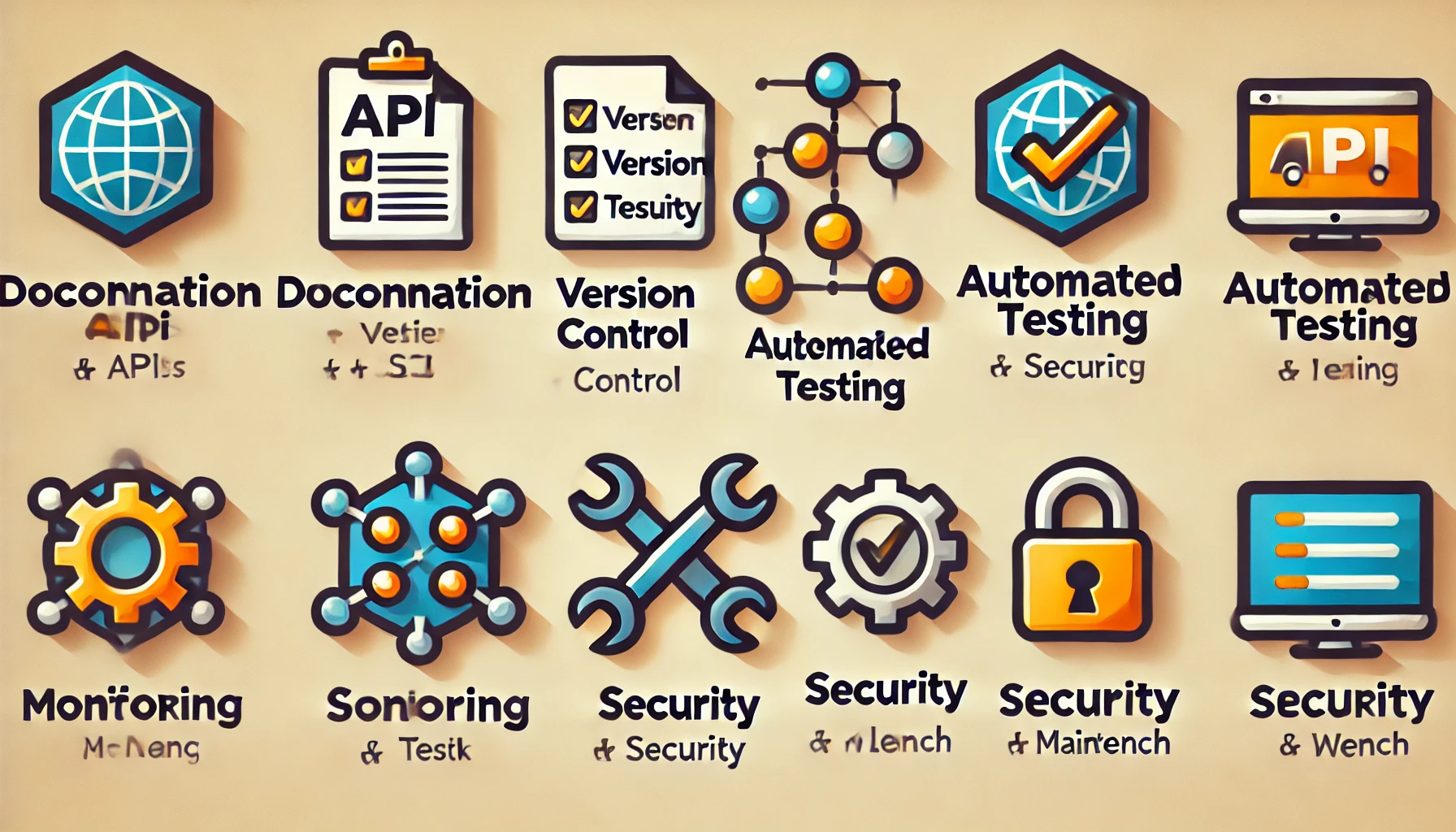
Managing API dependencies properly becomes very important so that big projects ensure correctness, stability, performance, and security. By following the best practices, you can prevent common problems and keep everything integrating smoothly between the different software components. Here are some best practices for managing API dependencies:
Comprehensive Documentation
Make sure all your API dependencies are thoroughly documented and kept up-to-date. This includes documentation about what each API does, its endpoints, the data it manipulates, and any dependencies it has upon other APIs. Comprehensive documentation will give an understanding of each API’s role, change tracking, and troubleshooting issues. Swagger and Postman are tools to develop and maintain API documentation.
Robust Version Control
A strong version control mechanism would be the second critical approach toward update management and ensuring compatibility between the APIs. Semantic versioning is a prevalent approach in which version numbers reflect the level of changes: major, minor, or patch. This also gives a clear signal regarding breaking changes for every part. At the same time, one must establish API versioning guidelines and communicate them appropriately to all stakeholders.
Automated Testing
The other critical aspect of the design of APIs is testing. This might help ensure your APIs work correctly and that new releases do not introduce new issues. Although it is possible to add automated tests to your development pipeline, all potential problems will be detected early while checking that all dependencies linked to the API are functioning correctly. Unit tests, integration tests, or end-to-end testing can be automated for various parts of the APIs.
Monitoring and Logging
Monitoring and logging are critical processes in keeping APIs up and running with consistent performance. In particular, the monitoring tool would provide visibility in real-time into the operation of the API, aid in latency problem detection, and alert you to anomalies that might potentially break the system. Meanwhile, logging details of both requests and responses from APIs are primarily used for troubleshooting and analytics. Other widespread monitoring and logging tools are New Relic, Datadog, ELK Stack, and so on.
Security and Compliance
Use end-to-end security best practices concerning API dependencies. The OAuth and JWT standards of API security, in turn, make sure that the organization remains consistent with industry standards and compliant with standards such as GDPR, HIPAA, or PCI-DSS.
Regular Updating and Maintenance
Another very critical issue relating to the security, performance, and functionality of your APIs is having them updated and maintained in a timely fashion. This most often takes the form of security patches and performance optimizations, along with continuously updated documentation. Of course, maintenance should be done regularly to ensure that APIs are not only protected but also updated with best practices.
DM WebSoft LLP is well-positioned to help organizations execute these best practices in managing API dependencies. Our experts provide tailor-made solutions, from documentation and versioning to auto-testing, from concept to implementation and monitoring. In that way, under our service, you relax in the knowledge that your API dependencies are harmoniously integrated to deliver peak performance, thus freeing you up to get back to your core business agenda.
The tools and technologies to manage API dependencies
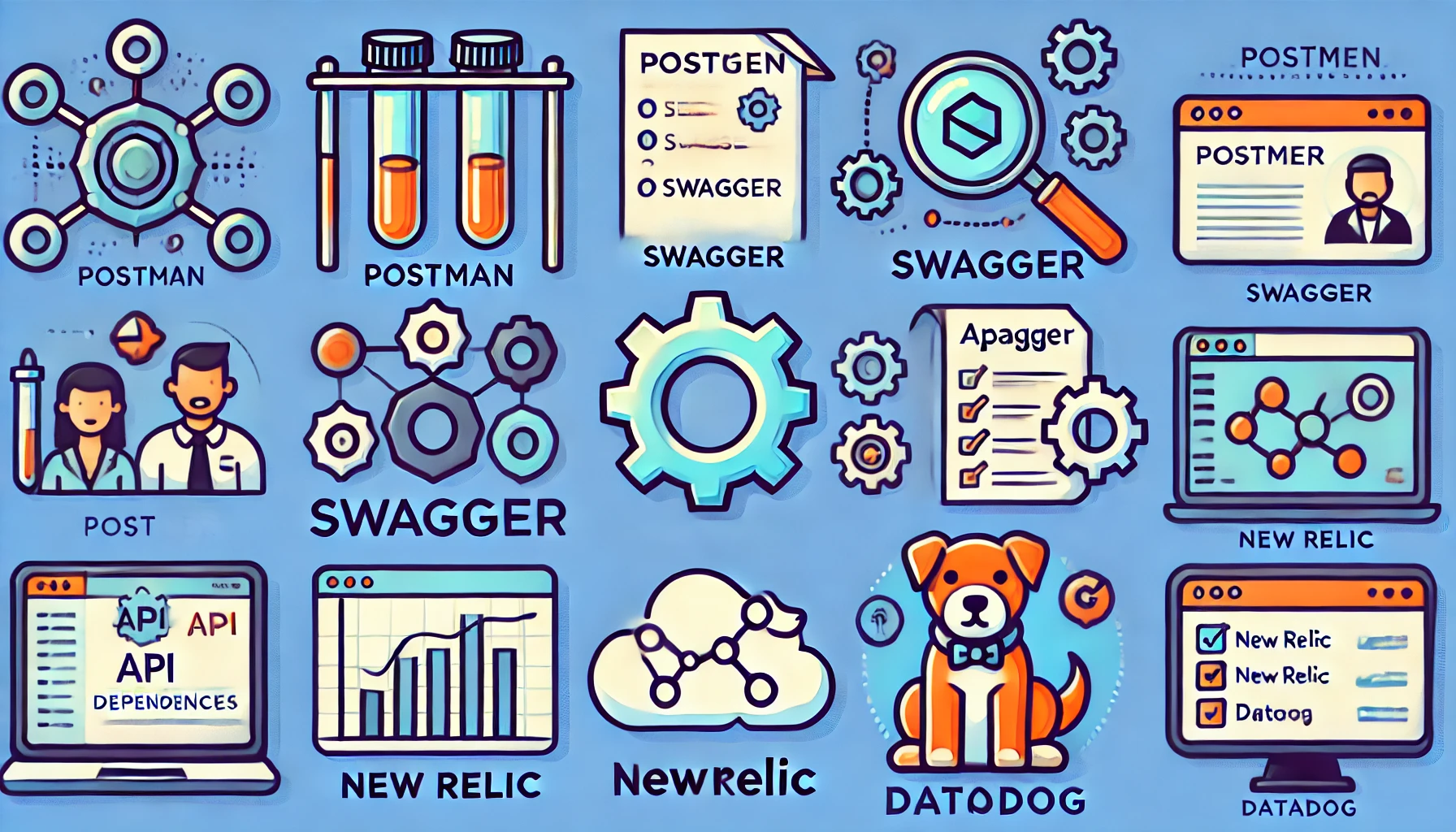
The availability of appropriate tools and technologies effectively helps one to manage such dependencies for APIs in projects of a sizable nature. These tools automate the different aspects of API management that involve their being well-documented, tested, and perpetually watched over. Let us discuss the most popular tools and technologies in managing API dependencies and how they could help your projects.
Postman
Postman is a popular development and testing tool for APIs that enables developers to create, share, test, and document APIs easily. With Postman, you can automate API testing to ensure your APIs work correctly and catch problems early. Advanced in supporting deep documentation for APIs, it enables the auto-generation and maintenance of such deep documentation, thereby tracking dependencies seamlessly.
Advantages of Postman:
- Simplifies the process of API development and testing.
- Automates API tests, reducing manual effort.
- Generates detailed API documentation.
- Provides collaboration features to team members.
Swagger
Swagger is an API design, build, and documentation framework for RESTful APIs. The tooling allows the API developer to use the features of Swagger Editor, Swagger UI, and Swagger Codegen to ease the process involved in API development. Swagger makes your APIs interactive, easing developers’ work in trying and getting what they might need from your APIs. It also supports API design and testing—ensuring that dependencies are well-documented and operational.
Benefits of Swagger:
- Simplifies API design and documentation.
- Makes it easy to understand and use interactive API documentation.
- Supports automated API testing.
- Enhances the working collaboration among the development teams.
Apigee
Apigee is an intelligent API management platform on Google Cloud with tools to develop, secure, deploy, and monitor APIs. It helps manage API dependencies with features for analytics, traffic management, security, and dependencies. Its support for versioning and governance is what helps in the seamless maintenance of compatibility and security within your APIs.
Benefits of Apigee:
- A full-featured API management platform.
- Delivers leading advanced analytics and monitoring functions.
- It supports API versioning and governance.
- Enhances security and performance of APIs.
New Relic
The New Relic platform is a critical monitoring and observability platform, allowing users to get real-time insights into the performance of your API. Monitor how fast your APIs are with response times, error rates, and throughput. Identify and solve performance bottlenecks. Plus, New Relic will provide you with comprehensive logs and alerts to enable you in the proactive management of dependencies.
Benefits of Using New Relic:
- Offers real-time monitoring and analytics.
- Helps identify and address performance problems.
- It provides very detailed logging and alerting for proactive management.
- Enhances visibility into API performance.
Datadog
Datadog is a cloud-based monitoring and analytics platform that helps track performance for APIs. Datadog provides visibility on a number of requests, response times, and error rates related to the respective APIs. Moreover, it helps link into integrations of tools and services to provide complete visibility, which is very useful when managing APIs in large projects.
Benefits of Datadog:
- Comprehensive monitoring and analytics platform.
- Tracks API performance metrics in real-time.
- Supports the integration of a wide range of tools and services.
- Enhances visibility and management of API dependencies.
We have been there for you at DM WebSoft LLP, using tools and cutting-edge technologies to deal with your API dependencies. Our many years of accumulated experience in managing APIs provide assurances that your dependencies are documented, tested, and monitored correctly, all free for you to devote proper attention to the main objectives of your business. You would be working with all our skills and a complete solution that assures success in your major projects.
Real-Life Success Stories
To get a sense of how API dependency management can be pragmatic, some real-life case studies are presented here to show how companies were able to address challenges, surpass goals, and succeed in business, often by managing their dependencies effectively.
Success Stories 1: E-Commerce Platform
An e-commerce platform experienced intensive difficulties maintaining dependencies associated with APIs that integrated multiple payment gateways, shipping providers, and marketing tools. Each integration represented an API dependency that needed careful management to ensure seamless operation.
Challenges:
Too frequent version updates for the payment gateway APIs create a problem of compatibility.
Solution:
The e-commerce platform integrated comprehensive documentation and robust version control practices.Automated tests written in Postman were conducted to ensure that changes in APIs would not break them. Monitoring performance with New Relic allowed for quick bottleneck detection. OAuth was implemented for authentication, and access permissions for the API were regularly reviewed for security purposes.
Results:
- Proactive testing and monitoring keep downtime to a minimum.
- Better performance during peak traffic hours.
- Improved security with strong authentication.
Success Stories 2: Health Care Provider
Integrating different systems for patient management is highly complicated with medical databases and third-party services. All these integrations led to problems in control over dependencies of APIs; consequently, they influenced the reliability and performance of the system.
Challenges:
- Difficulty to keep documentation updated.
- The latency problem impacts data retrieval time.
- Ensuring that the organization complies with HIPAA.
Solution:
- Swagger was chosen to document APIs, allowing the healthcare provider to develop interactive, easily accessible documentation. Apigee was employed by the healthcare provider for API management and endowed with advanced analytical and monitoring capabilities.
- Optimization of endpoints of APIs to fix latency issues was practiced, coupled with the use of Datadog to monitor the performance metrics. Routine compliance audits were done to ensure that the HIPAA regulations were being maintained.
Results:
- Streamlined API management with comprehensive documentation.
- This means less latency and lower data retrieval time.
- Ensured that all the data is secured through compliance with HIPAA.
Success Stories 3: Financial Services Organization
The financial services firm was experiencing difficulties with dependencies in its APIs because it had a broad range of integrations, such as banking, financial data providers, and integration of fraud detection service integrations.. These dependencies became crucial in the company’s daily work and needed proper management.
Challenges:
- Handling frequent API version changes.
- It is ensuring the security of transactions involving money.
- Keeping high throughput and low latency.
Solution:
- The Financial Services company adopted semantic versioning for API version control so that compatibility could be maintained and updates remain seamless, this was complemented by automatic testing and documentation done via Postman and Swagger.
- They employed JWTs to enhance security when authenticating APIs and used New Relic to monitor the performance and quickly troubleshoot errors in their APIs.
Results:
- Robust version control allows for seamless API updating.
- Security in financial transactions is enhanced.
- Low latency, providing high-performance user experience.
At DM WebSoft LLP, we have helped our clients to successfully manage their API dependencies with customized solutions and advanced tooling. Our experience in the management of APIs ensures that your projects are realized with no glitches, securely, and at peak efficiency. We support you in facing challenges, thus helping you to fully realize your business goals, either through comprehensive documentation, automated testing, or performance monitoring.
How Can DM WebSoft LLP Help
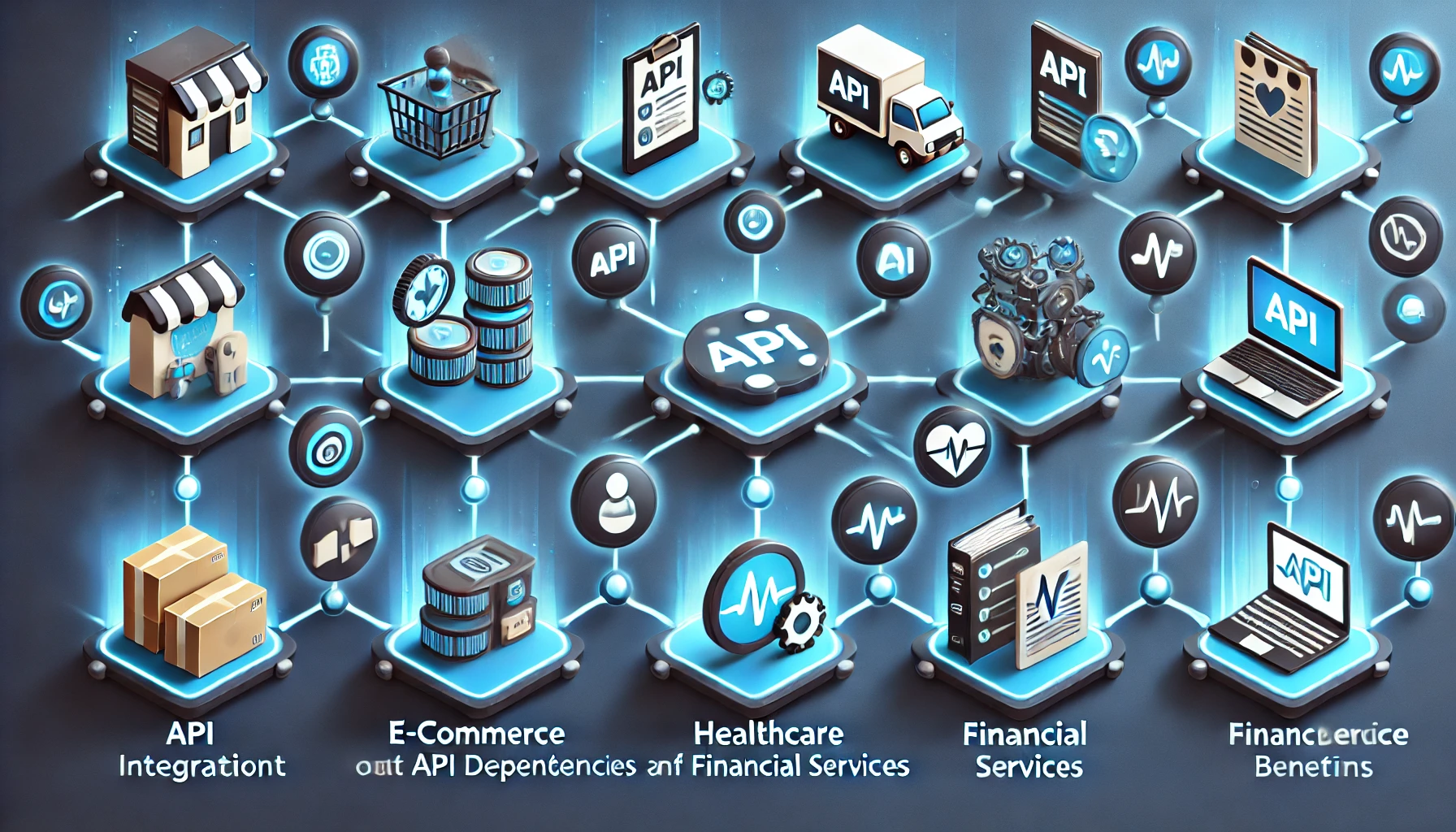
One of the most critical success points for any significant project is effective API dependency management. This process is quite complex and usually takes up much time, but DM WebSoft LLP can offer you a full-scope solution for your needs in terms of API management. With our experience, your API dependencies will be managed with a higher level of precision, so your projects run smoothly, securely, and effectively. Here’s how we can help:
Comprehensive API Documentation
Robust documentation for proper API management: We document extremely well at DM WebSoft LLP, making our APIs clear and easy to use. We document functionality, endpoints, data formats, and dependencies in Swagger and Postman. Fully detailed documentation greatly simplifies troubleshooting, integration, and updates, therefore giving your team every necessary piece of information right at their fingertips.
Strong Version Control
Frequent API updates can be cumbersome to deal with, especially when there is a requirement for backward compatibility. We have robust mechanisms in terms of version control, through things like semantic versioning, put in place with our API to keep the version in check. It helps a lot in pinpointing changes that may potentially break your already existing system to identify and plan updates without breaking it apart. Our strategies of version control will ensure the compatibility of your APIs and their functioning across different versions.
Test Automation
The use of advanced testing tools on the market, like Postman, in automatizing tests of APIs, assures that they function well and that new faults are not being introduced with updating. Our test automation supports unit tests, integration tests, and end-to-end tests, all of which go toward executing comprehensive validation of your APIs’ performance and functionality.
Monitoring and Performance Optimization
Keep a watch on the performance of the API; identify bottlenecks and resolve them. At DM WebSoft LLP, we use monitoring tools like New Relic and Datadog to monitor your APIs in real-time. These kinds of tools help us get into details on the average response time of APIs, error rates, and throughput—to have problems detected and solved effectively. Our performance optimization services guarantee that your APIs run efficiently even under high load conditions.
Security and Compliance
Security is the biggest concern in API management. We put in place robust authentication and authorization mechanisms, such as OAuth and JWT (JSON Web Token), for your APIs to guarantee that unauthorized users will not use your APIs. Moreover, we ensure that all your APIs are compliant with industry standards or regulations, for example, the GDPR, HIPAA, or PCI-DSS. Our security measures secure sensitive data and keep you away from any legal complications.
Customized Solutions and Professional Support
Just as the needs are, every project is different. We at DM WebSoft LLP provide customized solutions to cater to respective requirements. Our experts will be engaged with your project to understand its goals and the challenges in realization and proffer custom strategies and tools to manage dependencies on your APIs effectively. Be it your first point of consultation or after-services, we are dedicated to your success.
Success Stories and Testimonials
With our more-than-favorable track record, we have been able to enable many clients in many industries to manage their API dependencies. For instance, a leading e-commerce company implementing our all-encompassing management solution noticed a significant decline in downtime and performance issues. Similarly, the healthcare provider optimized time for data retrieval and brought its organization into compliance with HIPAA with our custom services. Stories of that sort drive us toward the quality solutions of API management to deliver results.
Call to Action
Are you struggling to manage dependencies in the APIs? Let DM WebSoft LLP help you sort it out to rise above these challenges and meet the goals of your projects. Please contact us so that we can discuss our API management services in detail and understand how we can tailor them specifically for you. Coupled with our expertise and advanced tools, you can be sure that the integration of your APIs is seamless, safe, and high-performing.
API dependencies refer to the reliance of software components on external APIs to function correctly.
Proper management ensures seamless integration, reduces downtime, and enhances performance and security.
Challenges include version control issues, performance bottlenecks, security concerns, and maintaining comprehensive documentation.
Tools like Postman, Swagger, Apigee, New Relic, and Datadog are essential for effective API management.
DM WebSoft LLP provides tailored API management solutions, including documentation, version control, testing, monitoring, and security.
Get Started Now !
What’s the Process ?
Request a Call
Consultation Meeting
Crafting a Tailored Proposal
Get Started Now !
Real Stories, Real Results. Discover What Our Clients Say

Working with DM WebSoft LLP was a game-changer for our business. Their technical prowess and innovative solutions transformed our online presence. A highly recommended web development agency with a stellar track record.

We are thrilled with the results DM WebSoft LLP delivered. Their deep understanding of web development coupled with years of expertise ensured a seamless and visually stunning website. True professionals!

In a digital age where first impressions matter, DM WebSoft LLP crafted a website that speaks volumes. The team’s attention to detail and commitment to quality set them apart. Thank you for making our vision a reality.

DM WebSoft LLP’s team demonstrated unparalleled expertise. Their ability to navigate complex technical challenges with ease is truly commendable. Choosing them for our web development needs was the best decision.

Exceptional service, unmatched skills! DM WebSoft LLP stands out as a leading web development agency. Their collaborative approach and commitment to excellence make them our go-to partner for all things web-related.

DM WebSoft LLP turned our ideas into a digital masterpiece. The seamless communication and timely delivery of our project showcased their professionalism. Highly impressed with the level of creativity and skill.

Our experience with DM WebSoft LLP was nothing short of amazing. From concept to execution, their team provided top-notch web development services. A reliable partner for businesses looking to elevate their online presence.

DM WebSoft LLP’s team of tech experts is second to none. Their wealth of experience reflects in the quality of their work. Our website not only meets but exceeds industry standards, thanks to their dedication.

Choosing DM WebSoft LLP was the best investment for our web development needs. Their team’s proficiency, coupled with a customer-centric approach, made the entire process smooth and enjoyable. A pleasure to work with!



